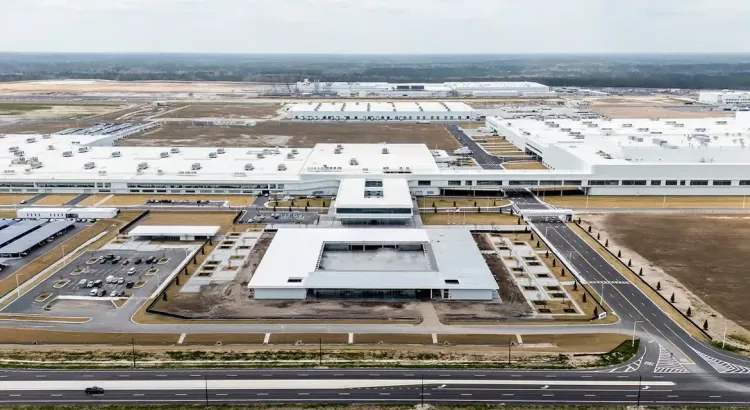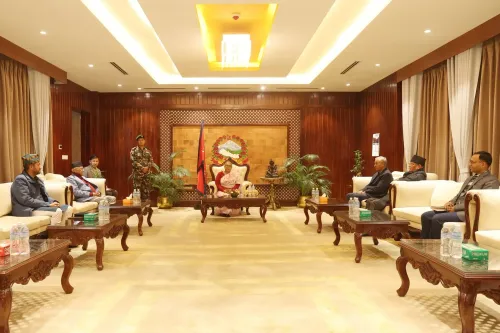How Does the US Crackdown Affect Economic Ties with South Korea?

Synopsis
Key Takeaways
- US immigration raid raises concerns over economic ties.
- Approximately 300 South Korean workers detained.
- Potential reconsideration of investments by Korean firms.
- Impact on the Korean auto industry anticipated.
- Calls for improved US visa regulations from South Korean businesses.
Seoul, Sep 11 (NationPress) The recent US immigration operation that resulted in the detention of hundreds of South Korean workers in Georgia has not merely embarrassed a key ally of the United States but has also inflicted a "deep scar" on the economic relationship between the two nations, increasing volatility for foreign investments in the US, industry analysts indicated on Thursday.
Approximately 475 workers were apprehended, including around 300 South Koreans, during a raid at a Georgia construction site for an electric vehicle (EV) battery factory being established by a Hyundai Motor Group-LG Energy Solution partnership, citing allegations of unlawful employment practices.
The South Korean workers are scheduled to return home this Friday via a chartered Korean Air flight from Atlanta, according to reports from Yonhap news agency.
This unusual, if not unprecedented, raid on laborers from an allied nation occurred just 10 days following a summit between South Korean President Lee Jae Myung and U.S. President Donald Trump, raising significant concerns about the alliance and unsettling numerous South Korean firms operating or intending to invest in the US, industry observers noted.
The incident could jeopardize the substantial US investments planned by South Korean firms, including a $350 billion commitment made under a trade agreement in July. Many analysts believe it may also deter engagement in the Seoul-led initiative dubbed "Make American Shipbuilding Great Again" (MASGA), which aims to rejuvenate the US shipbuilding industry.
"This was not just an act of detaining about 300 individuals -- it was a profound insult," stated Kim Pil-soo, an automotive engineering professor at Daelim University. "Inevitably, U.S. investment will require reassessment or postponement."
"Unless comprehensive safeguards, such as special programs linked to MASGA, are implemented, South Korean investments in the U.S. will unfailingly be reconsidered or delayed," he contended.
Kwon Yong-joo, a professor at Kookmin University in Seoul, concurred that the raid will likely compel Korean companies, including Hyundai Motor, to reassess or even rethink their U.S. investment strategies.
"The raid at the Hyundai-LG plant site will likely have significant repercussions on the Korean auto sector, pushing Hyundai Motor Group to reorganize its EV strategy, which is heavily centered on the U.S. market," Kwon stated, also emphasizing that any delay in the construction of the battery facility may disrupt operations at Hyundai Motor Group Metaplant America (HMGMA), situated in Georgia.
HMGMA, Hyundai's dedicated U.S. EV factory, commenced operations in October, while the $4.3 billion joint battery plant was initially slated for completion next year.
"Korean automakers must further diversify their export markets by seeking opportunities in Europe while increasing the production of gasoline-hybrid models in their U.S. facilities," Kwon added.
Experts highlighted that numerous Korean companies have depended on Korean workers and subcontractors for construction and engineering roles, yet they have encountered visa delays and stringent quotas for skilled professionals.
In the wake of the upheaval, South Korea's business sector has intensified calls for clearer and improved U.S. visa regulations.
During an investment roundtable convened this week by the Ministry of Trade, Industry and Energy, prominent firms urged the government to secure assurances from Washington that B-1 business visa holders would not face enforcement actions while fulfilling duties like equipment installation or on-site training.
The B-1 visa allows foreign employees to set up and test machinery acquired from abroad or train local personnel, as per the U.S. State Department's Foreign Affairs Manual.
While it does not permit direct employment on production lines or construction sites, industry representatives assert that confusion has escalated after reports indicated that B-1 visa holders were among those detained in last week's Georgia raid.
"Entering the U.S. under the Electronic System for Travel Authorization (ESTA) program and working on-site is illegal," an industry source clarified. "However, with a B-1 visa, installation, maintenance, and training activities are permitted. The fact that B-1 holders were included in this raid has generated considerable confusion for companies."
Nonetheless, many analysts believe that this incident will not result in an immediate decrease or withdrawal of investments in the U.S. by South Korean firms, primarily due to high tariffs imposed by the Trump administration on imports.
"If Korean companies do not establish local production in the U.S., they will be unable to sell their products under the Trump administration. Adhering to local regulations is an unavoidable requirement," stated Kim Tae-nyen, president of Mirae Mobility Research and Services.










